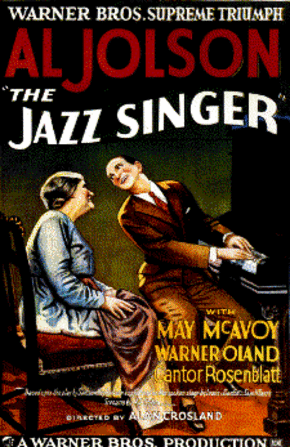
THE JAZZ SINGER
US, 1927, 88 minutes, Black and white.
Al Jolson, May Mc Avoy, Warner Oland.
Directed by Alan Crosland.
The Jazz Singer has its place in history as the first talking picture. However, it is a silent film with some scenes with talking but, especially, Al Jolson’s songs, such as Blue Skies, Swanee, Toot Toot Tootsie, Dirty Hands, Dirty Face.
Al Jolson had a spectacular career in vaudeville and in theatre. The film capitalises on his strong presence, although he was rather unprepossessing in appearance. His main success was in the theatre.
The film is based on a play by Samuel Raphaelson, the story of a cantor (here played by Warner Oland, more famous for being Charlie Chan). He clashes with his son who is more interested in popular music and jazz. After a falling out, the son leaves home, the father hardening his attitudes despite the pleas from his mother. The film shows the success of the young boy, meeting Mary Dale, a singer and dancer, becoming more involved in show business. However, his heritage still gnaws at him and at the end he has to make a decision about going to his dying father or opening on Broadway.
The film is always interesting, Al Jolson a strong presence, his songs being attractive – and later classics for Jolson.
Jolson himself was to supply the songs for two biographical films twenty years later, with Larry Parks miming to his voice, The Jolson Story and Jolson Sings Again.
Alan Crosland was a prolific director of silent and then sound films from 1916 to the mid-1930s. The Jazz Singer was his most outstanding film.
There was a remake of The Jazz Singer in 1952 with Danny Thomas as the singer. There was a further remake in 1980, much derided by critics, with Neil Diamond as the singer and Laurence Olivier as the cantor.
1. The classic status of the film, the silent film-making traditions, the innovations of sound, for dialogue, for song?
2. The impact in its time, its place in history, the usual techniques, silent film and captions, the exaggerated miming for performance? The importance of the sound sequences, the score, the songs? The basic dialogue?
3. Al Jolson and his talent, in vaudeville and Broadway, on the screen? Recreating his appeal?
4. The strong Jewish background of the film, Jews in New York City, life at the synagogue, the cantor and his family, upholding traditions, the people gathering for worship, the shawls (and the many gifts of shawls for the cantor) and prayer, chant, song? The strictness of Jewish observance? 1927 and the Jews in the United States? The generally reticent presence of Jews in films despite the moguls – this film being quite forthright? The communities and their style? The background of anti-Semitism in the United States?
5. The character of the cantor, a strong man, his age, solemnity? Single-minded and harsh? The clashes with his son, disowning him? His loathing of jazz? Music related to religion? His son’s return, the further clashes, his collapse? His son’s final return, his illness, hearing his son singing the worship music, his death? The mother, loving her son, loving her husband, loyal to him? Kind but sad? Her son and his enthusiasm, his playing Blue Skies for her? With her friends, the gifts of the shawls, her going to the theatre? The realisation of her son’s gift? The end?
6. Jakie, the concert, hearing the cantor, the traditions, heartfelt? The importance of song, song in worship, the singer and the relationship with God?
7. Jakie leaving home, the pubs, his singing, his missing his father, keeping away? Life as an adult, the cafés, singing, Dirty Hands, Dirty Face, Toot Toot Tootsie? The opportunities, the scouts, meeting with Mary, the audition? Singing Mother of Mine? The ups and downs, the agent, the offer for Broadway? The audition, the rehearsal? His putting on blackface and doing the minstrel show – popular at the time (and the criticisms later)?
8. The visit home, his mother, Blue Skies, his playing the jazz, his love for the music, his giftedness?
9. The message about his father, his dilemma, talking with Mary, the priorities, the agent and the pressures on him?
10. No show, the director and the mother listening to him singing in the synagogue?
11. The show going on, singing Mammy for his mother? An Al Jolson slogan, ‘You ain’t heard nothing yet’?